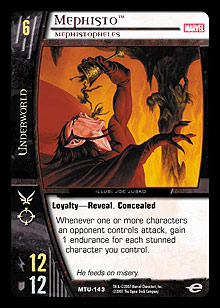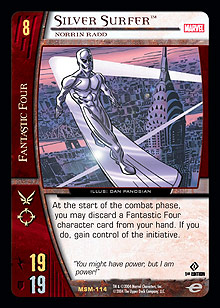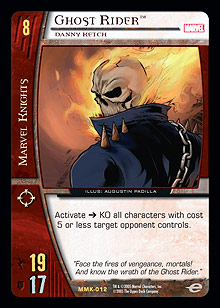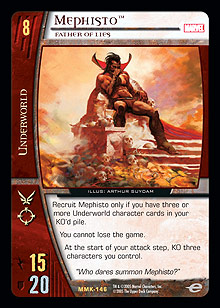Welcome back to Living Ink, a weekly series that explores a bit of history and background information for a character from the current set before analyzing how that character is represented in Vs. System at large.
 “Come on, Milhouse, there is no such thing as a soul. It's just something they made up to scare kids—like the boogeyman or Michael Jackson.”
“Come on, Milhouse, there is no such thing as a soul. It's just something they made up to scare kids—like the boogeyman or Michael Jackson.”
What Bart greatly undervalues in The Simpsons Season 7 episode “Bart Sells His Soul,” this week’s feature character collects with a fervor matched only by that guy at your local Hobby League who obsessively collects copies of J. Jonah Jameson. You know the one I’m talking about (I shouldn’t actually make fun of that guy, since I myself collect The Joker, The Clown Prince of Crime). That’s right, this week’s shining star of Vs. System is none other than the Father of Lies, Mephisto.
When we fanboys think about comic book villains, characters like Dr. Doom, Victor Von Doom; Magneto, Master of Magnetism; or The Joker, Laughing Lunatic leap to mind. But these dastardly dudes are mere would-be world conquerors, over-zealous mutant freedom fighters, and inconceivably insane killer clowns. While they can either be pitied for the personal tragedies of their pasts or their obvious mental illnesses, Mephisto is truly evil and wholly contemptible.
 Mephisto made his first comic book appearance in Silver Surfer Vol. 1 #3, which was published in October 1968 and created by Stan Lee and Sal Buscema. In that story, Mephisto found the inherent goodness of the Silver Surfer, Norin Radd so repulsive that he committed himself to corrupting the Skyrider of the Spaceways. These attempts—as you would expect—ended in failure. Soon after that, Mephisto made an appearance in Thor Vol. 1 #180-181, and continues to be a semi-regular opponent for both Thor and the Surfer. Other heroes who regularly run into Mephisto are Dr. Strange, Sorcerer Supreme and Ghost Rider, Johnny Blaze, but theoretically every hero in the Marvel universe can count him as a foe, as Mephisto detests goodness and constantly works to propagate evil and suffering.
Mephisto made his first comic book appearance in Silver Surfer Vol. 1 #3, which was published in October 1968 and created by Stan Lee and Sal Buscema. In that story, Mephisto found the inherent goodness of the Silver Surfer, Norin Radd so repulsive that he committed himself to corrupting the Skyrider of the Spaceways. These attempts—as you would expect—ended in failure. Soon after that, Mephisto made an appearance in Thor Vol. 1 #180-181, and continues to be a semi-regular opponent for both Thor and the Surfer. Other heroes who regularly run into Mephisto are Dr. Strange, Sorcerer Supreme and Ghost Rider, Johnny Blaze, but theoretically every hero in the Marvel universe can count him as a foe, as Mephisto detests goodness and constantly works to propagate evil and suffering.
Mephisto is short for Mephistopheles, a name given to him by humans who believed him to be Satan—a misconception that he has fostered at times and would no doubt find flattering. It’s an easy mistake to make, after all; Mephisto is every bit as tricksy and deceitful as the Biblical baddy, and has an unnerving obsession with collecting souls from whoever is foolish enough to willingly offer them (I’m looking at you, Bart Simpson). The most popularly held origin for Mephisto is that he is one of the Lords of Hell (although not the most powerful demon in existence; his character profile on www.marvel.com lists him as a “Class Two Demon”). It has also been suggested that Mephisto was created by the cosmic entity Infinity prior to the creation of the known universe. In the end, however, the source for most of this information is Mephisto himself. Given his inclination toward obfuscation and the fact that he has offered conflicting reports about his origins, the true story may never be fully known.
In addition to all the misery Mephisto has caused over the years, he has also sired a number of children (most noticeably the demons Blackheart, Son of Mephisto; Mephista; and Malevolence, though the latter was from an alternate reality) who have wreaked their own havoc on the Marvel universe.
Mephisto has phenomenal supernatural powers, and is essentially invulnerable to conventional harm. He wields mystical energy to create a wide range of effects including force blasts, matter manipulation, astral projection, interdimensional portals (see Infernal Gateway), illusion-casting, and shape-shifting. A portion of his power seems to be tied to the realm in which he resides (which is sometimes called “Hell” or “Hades,” but is in fact neither if one goes by their classical definitions), and is influenced by the number of souls trapped within it. If by some chance Mephisto is destroyed, he will naturally begin to regenerate and reform in “Hell.” As previously suggested, he also has the ability to take possession of living souls that are given freely, usually in the form of some pact. Mephisto cannot indiscriminately abduct souls at will, but regularly uses misinformation and trickery to convince his victims to offer up their souls in exchange for some reward. Needless to say, these usually turn out to be very bad deals for the victims. Mephisto takes particular interest in the souls of extremely powerful or exceptionally pure beings.
According to Mephisto’s entry on Wikipedia, three acts of almost unparalleled evil are the most infamous of the Lord of Hell’s diabolical deeds.
 The first was capturing the soul of Dr. Doom’s mother, Cynthia Von Doom, and holding it for many years. Doom tried and failed to single-handedly liberate his mother’s soul, but was successful on a subsequent mission with the aid of Dr. Strange. This story was portrayed in the graphic novel Triumph and Torment: Dr. Strange and Dr. Doom, published in 1989.
The first was capturing the soul of Dr. Doom’s mother, Cynthia Von Doom, and holding it for many years. Doom tried and failed to single-handedly liberate his mother’s soul, but was successful on a subsequent mission with the aid of Dr. Strange. This story was portrayed in the graphic novel Triumph and Torment: Dr. Strange and Dr. Doom, published in 1989.
The second was when Mephisto, in the guise of Satan, bonded the demon Zarathos, Spirit of Vengeance to the soul of motorcyclist Johnny Blaze. This, of course, is the origin of Ghost Rider as shown in Marvel Spotlight Vol. 1 #5, published in August 1972. (As a quick aside, Mephisto features as a character in the 2007 film adaptation of Ghost Rider!)
The third happened a while ago in the comics, but had a very large impact on the Marvel universe fairly recently. Mephisto manipulated a sorcerer named Master Pandemonium into gathering the scattered fragments of Mephisto's soul. Two of those fragments had been drawn into the body of Scarlet Witch, Wanda Maximoff, who had unknowingly absorbed them in an attempt to magically conceive children with the android Vision. The fragments eventually became a pair of infant twins, who were later absorbed back into Mephisto's essence. The revelation of her children's origins—followed by their loss—eventually drove Scarlet Witch insane, which in turn resulted in the events of Avengers Dissembled and House of M. Mephisto’s involvement in these events was seen in Vision and the Scarlet Witch #1-12 (published in 1985-1986), and in Avengers West Coast Vol. 1 #51-52.
I haven’t had a lot of exposure to Mephisto in the comic books, but his impact and influence on the Marvel universe is undeniable. From the above, we can see that he played a leading role in the creation of a popular hero, Ghost Rider, and sowed the seeds of anarchy that shook the entire universe to its core in House of M.
 Mephisto, Soulstealer is 5-drop from the Marvel Knights set. Although he is the smallest version of Mephisto in terms of cost and stats, this is the version that has had the biggest impact on Vs. System play to date. Featuring in decks that aim to deny their opponents access to characters in the KO’d pile, as well as in decks that try to fill up their own KO’d pile and then swing with a massive concealed attacker, Mephisto has appeared in many tournament decks. More importantly for this article, though, is that this character card is just as impressive in terms of flavor. Concealed reflects Mephisto’s preference for hanging back and manipulating events from the shadows, but it’s the character’s payment power that best represents this comic book villain. Mephisto can consume the souls of fallen characters (by removing them from the KO’d pile and the game) to fuel a massive increase in his power. Whether it be an earth-shaking mystical energy blast or a soul-powered super punch, if there are enough bodies in KO’d piles around the table, Mephisto is capable of a turn 5 game-winning attack. The fact that his natural ATK and DEF are well below average for his cost is also very cool because (as mentioned in the above profile) his power level is tied to the number of souls trapped in his realm. The fewer souls he has, the weaker his power. I believe this card is an almost perfect representation of Mephisto’s character. Finally, kudos go to Australian Metagame.com reporters Julia Birks and Kieran Otton (as well as Julia’s usual partner in crime, Rob Davis) for the hilarious Top 8 profile photo of $10K Sydney winner Kakarot Turker, which was an homage to the Soulstealer.
Mephisto, Soulstealer is 5-drop from the Marvel Knights set. Although he is the smallest version of Mephisto in terms of cost and stats, this is the version that has had the biggest impact on Vs. System play to date. Featuring in decks that aim to deny their opponents access to characters in the KO’d pile, as well as in decks that try to fill up their own KO’d pile and then swing with a massive concealed attacker, Mephisto has appeared in many tournament decks. More importantly for this article, though, is that this character card is just as impressive in terms of flavor. Concealed reflects Mephisto’s preference for hanging back and manipulating events from the shadows, but it’s the character’s payment power that best represents this comic book villain. Mephisto can consume the souls of fallen characters (by removing them from the KO’d pile and the game) to fuel a massive increase in his power. Whether it be an earth-shaking mystical energy blast or a soul-powered super punch, if there are enough bodies in KO’d piles around the table, Mephisto is capable of a turn 5 game-winning attack. The fact that his natural ATK and DEF are well below average for his cost is also very cool because (as mentioned in the above profile) his power level is tied to the number of souls trapped in his realm. The fewer souls he has, the weaker his power. I believe this card is an almost perfect representation of Mephisto’s character. Finally, kudos go to Australian Metagame.com reporters Julia Birks and Kieran Otton (as well as Julia’s usual partner in crime, Rob Davis) for the hilarious Top 8 profile photo of $10K Sydney winner Kakarot Turker, which was an homage to the Soulstealer.
Mephisto, Mephistopheles is an Underworld 6-drop from the brand-spanking-new Marvel Team-Up expansion. Similarly themed around souls and concealed, this Mephisto draws endurance from all of the stunned characters you have when your opponent attacks. Mephisto likes to have a lot of souls hanging around his realm to snack on or to provide him random amusement, so it’s fitting that the Underworld affiliation in Marvel Team-Up has the means to keep stunned characters in play—and extract some advantage from them.
 Mephisto, Father of Lies is the 8-drop version of the character from Marvel Knights. In addition to having one of the most beautiful pieces of artwork in Vs. System, this card is another excellent example of how UDE has successfully translated the flavor of the comic books into the game. This card not only represents the fact that Mephisto is immortal, but also reflects the kind of crazy bargains he offers to his victims. Playing him will require a significant sacrifice; KO’ing three characters a turn is a massive cost. But what a benefit! You can’t lose and your opponents can’t win. This is the sort of card that makes Timmy froth at the mouth. Not losing is still not the same as winning, though. and keep in mind that the price Mephisto demands will be very difficult to meet over multiple turns. If you don’t have the souls to sacrifice, Mephisto will just take as much as you have and then pack off back to Hades, leaving you without a single character to defend yourself. That’s a risky deal, indeed.
Mephisto, Father of Lies is the 8-drop version of the character from Marvel Knights. In addition to having one of the most beautiful pieces of artwork in Vs. System, this card is another excellent example of how UDE has successfully translated the flavor of the comic books into the game. This card not only represents the fact that Mephisto is immortal, but also reflects the kind of crazy bargains he offers to his victims. Playing him will require a significant sacrifice; KO’ing three characters a turn is a massive cost. But what a benefit! You can’t lose and your opponents can’t win. This is the sort of card that makes Timmy froth at the mouth. Not losing is still not the same as winning, though. and keep in mind that the price Mephisto demands will be very difficult to meet over multiple turns. If you don’t have the souls to sacrifice, Mephisto will just take as much as you have and then pack off back to Hades, leaving you without a single character to defend yourself. That’s a risky deal, indeed.
Last but not least is another short reading list:
· Silver Surfer Vol. 3 #45 (1987) and Doctor Strange Vol. 3 #8 (1989) – Mephisto’s origin.
· Marvel Spotlight Vol. 1 #5 (1972) – Mephisto bonds Zarathos to Johnny Blaze, creating Ghost Rider (republished in black and white in Essential Ghost Rider Vol. 1).
· Mephisto vs. #1-4 (1987) – Mephisto opposes the Fantastic Four, X-Factor, X-Men, and Avengers in this limited series.
· Triumph and Torment: Dr. Strange and Dr. Doom (1989)
· Devil’s Reign (1996) – Series of Marvel / Top Cow crossover comics, in which Mephisto attempted to conquer the Top Cow universe (republished in Top Cow/Marvel: The Crossover Collection)
See you in the funny pages,
Michael Pittman
ikeebear@hotmail.com